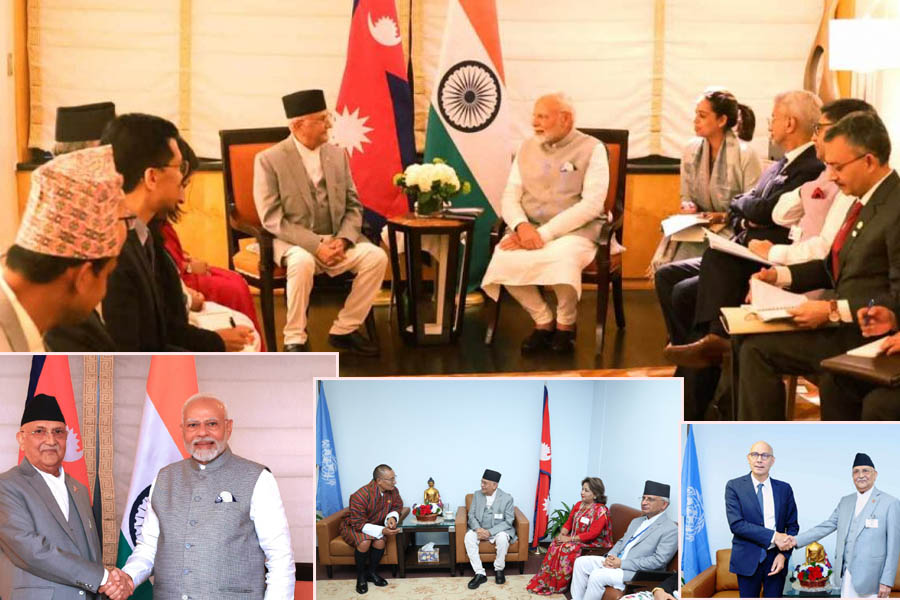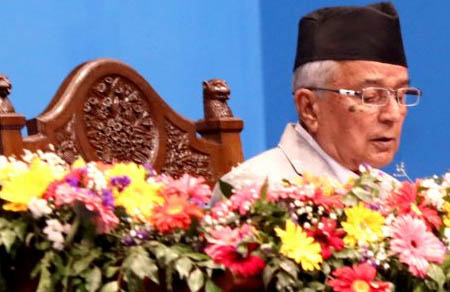
The much-anticipated meeting between Nepal's Prime Minister KP Sharma Oli and Indian Prime Minister Narendra Modi took place not in the familiar settings of Kathmandu or New Delhi, but in the global diplomatic hub of New York City. The encounter, which lasted just 30 minutes at the Lotte New York Palace, unfolded against the backdrop of the 79th United Nations General Assembly, where key geopolitical and economic issues were at the forefront.
A Glimpse into the Oli-Modi Dynamics
The brevity of the meeting between the two leaders belies the significance of the topics covered, ranging from energy cooperation to technology and trade. Modi's social media post following the meeting showcased two formal photos with the caption: "Meet Prime Minister Oli. India-Nepal relations are close. We will speed up this intimacy even more."
However, the formal tone of these images underscored the complexity of India-Nepal relations, which have seen both highs and lows in recent years. Oli's tenure as Nepal’s Prime Minister has often been marked by cautious diplomacy with India, particularly after the release of Nepal’s controversial political map in 2020, which heightened tensions. This meeting, however, indicated a mutual willingness to address ongoing issues and strengthen ties.
Addressing the 1950 Treaty and Economic Diplomacy
One of the key talking points between Oli and Modi was the revision of the 1950 Indo-Nepal Treaty of Peace and Friendship, a longstanding issue that continues to stir diplomatic debates. Oli advocated for a re-examination of the treaty’s terms, suggesting that the bilateral diplomatic mechanism should be activated to resolve ambiguities. Modi, in response, welcomed the proposal, marking a potential turning point in addressing historical grievances.
The meeting also focused on economic diplomacy, with both leaders emphasizing the need to enhance trade and energy cooperation, particularly in hydropower, where Nepal’s vast potential can benefit India’s energy needs.
Strengthening Ties with Bhutan
Oli’s side meetings at the United Nations extended beyond India, as he also met with Bhutanese Prime Minister Daso Chiring Togbe. The leaders discussed fostering people-to-people connections and enhancing commercial relations between Nepal and Bhutan. Oli reaffirmed Nepal's commitment to facilitating greater interaction at both the bilateral and multilateral levels.
Bhutan, like Nepal, shares deep cultural and historical ties with the birthplace of Buddha, and Togbe expressed gratitude for Nepal's ongoing goodwill toward Bhutan. Both leaders underscored the importance of peaceful coexistence and cooperation within the South Asian region, recognizing the shared challenges of development, climate change, and trade.
Nepal’s Leadership in Peacekeeping and Climate Justice
At the UN Assembly, Oli also highlighted Nepal's significant contribution to global peacekeeping. Nepal ranks first in the world for the number of peacekeepers deployed, a point of national pride. Oli pressed for greater recognition of Nepal’s role, advocating for more leadership positions for Nepalese personnel within the UN peacekeeping missions.
Oli further emphasized the urgency of climate justice, especially for countries like Nepal that have contributed minimally to global carbon emissions but are severely impacted by climate change. During his address at the Parliamentarians for Fossil Fuel Free meeting, Oli demanded that major carbon-emitting nations increase their financial contributions for climate adaptation efforts. He reiterated that Nepal’s melting glaciers and the global threat of rising sea levels necessitate immediate and equitable action.
Pushing for Diplomatic Reforms and UN Engagement
Oli's agenda at the UN also included a strong focus on expanding Nepal’s diplomatic reach within the United Nations. While Nepal’s peacekeepers are celebrated, Oli pointed out that the country has yet to secure significant policy-making roles at the UN headquarters. The Nepali delegation, including high-ranking military officials, is pushing for these opportunities, aiming to elevate Nepal's influence on global security and humanitarian platforms.
A Strategic Visit with Far-Reaching Implications
Prime Minister Oli’s visit to the United Nations has highlighted Nepal’s multifaceted approach to diplomacy. From strengthening ties with its neighbors to advocating for global climate and peacekeeping reforms, Oli is positioning Nepal as an engaged and influential member of the international community. His interactions with global leaders such as Modi and Bhutan’s Togbe, coupled with his outspoken advocacy for climate justice and peacekeeping reform, reflect his administration’s broader diplomatic goals.
As Oli continues his tenure, it remains to be seen how these diplomatic overtures will translate into concrete changes in Nepal’s foreign relations, particularly with India. Nonetheless, the willingness to engage, negotiate, and advocate at the highest levels of global diplomacy marks an important step forward for Nepal in asserting its role on the international stage.
#NepalAtUN 🌏 #KPSharmaOli 🤝 #IndiaNepalRelations 🇳🇵🇮🇳 #OliModiMeeting 🏛️ #BhutanNepal 🇳🇵🇧🇹 #GlobalPeacekeeping 🕊️ #ClimateJustice 🌍 #UNGA2024 🏛️ #EconomicDiplomacy 💼 #NepalPeacekeepers 👮♂️ #NepalInTheUN ✨
Thank you for reading: globalpostheadline.com





